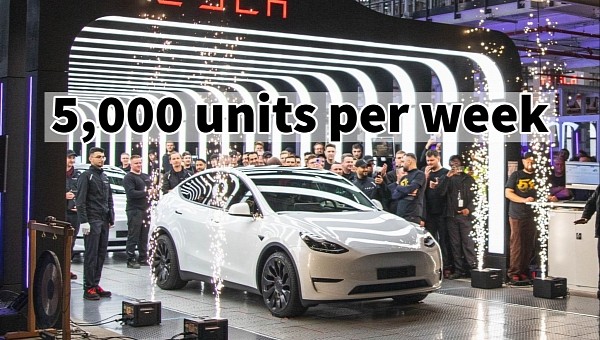Tesla marks another production milestone at Gigafactory Berlin, reaching 5,000 cars per week one year after delivering the first cars to customers. The German factory is slightly ahead of Giga Texas in this regard, although the latter is still a work in progress in preparation for the Cybertruck production.
Tesla built its two gigafactories in Texas and Germany roughly at the same time, although protests and Germany's famous bureaucracy delayed Giga Berlin's opening. For a while, it appeared that Giga Texas would ramp production faster than Giga Berlin, but it didn't happen.
There's an explanation for that, as Tesla only builds the Model Y in Berlin, and all it has to do is accelerate what it was already doing. In Austin, on the other hand, Tesla ramps up production and simultaneously sets up a new production line for the Cybertruck. Made-in-Austin Model Y must compete with the electric pickup for resources and production capacity.
We're not surprised to see production accelerating at Tesla's Gruenheide gigafactory. It ended 2022 with a 3,000-car-per-week production milestone and reported another record in February at 4,000 per week. On March 25, Tesla announced it assembled 5,000 vehicles in a week in Gruenheide, a new milestone achieved much faster than before. This shows that the production ramp is accelerating.
At this pace, Tesla is on track to build 250,000 cars at Giga Berlin this year, even without changing anything. This amounts to achieving "volume production" for the Model Y in Germany, a milestone that Tesla wanted to check by the end of 2022. The goal proved too ambitious amid a global supply-chain bottleneck that affected all automakers. Certainly, Tesla wants to go faster than that. The factory's approved production capacity is 500,000 vehicles per year, but it should not be all Model Ys. Instead, the American EV maker could add a second model in Berlin, possibly the refreshed Model 3 of Project Highland.
Tesla recently applied to double the production capacity in Gruenheide and promised to do it using the resources approved for the initial development phase. This means no additional water supplies or production buildings will be needed. This bold statement would surely appease the fierce environmentalist groups that threatened to derail the initial project in 2022. Tesla claims it could reach 1 million vehicles per year solely by optimizing planning and production processes.
While vehicle production seems to be going great, Tesla has dialed back ambitions to build battery packs in Germany. Lured by IRA incentives, it will produce the battery cells in the U.S. and then export them to Berlin to be integrated into the Model Y battery packs. Even so, the EV maker has started producing some non-critical battery components at Giga Berlin.
There's an explanation for that, as Tesla only builds the Model Y in Berlin, and all it has to do is accelerate what it was already doing. In Austin, on the other hand, Tesla ramps up production and simultaneously sets up a new production line for the Cybertruck. Made-in-Austin Model Y must compete with the electric pickup for resources and production capacity.
We're not surprised to see production accelerating at Tesla's Gruenheide gigafactory. It ended 2022 with a 3,000-car-per-week production milestone and reported another record in February at 4,000 per week. On March 25, Tesla announced it assembled 5,000 vehicles in a week in Gruenheide, a new milestone achieved much faster than before. This shows that the production ramp is accelerating.
At this pace, Tesla is on track to build 250,000 cars at Giga Berlin this year, even without changing anything. This amounts to achieving "volume production" for the Model Y in Germany, a milestone that Tesla wanted to check by the end of 2022. The goal proved too ambitious amid a global supply-chain bottleneck that affected all automakers. Certainly, Tesla wants to go faster than that. The factory's approved production capacity is 500,000 vehicles per year, but it should not be all Model Ys. Instead, the American EV maker could add a second model in Berlin, possibly the refreshed Model 3 of Project Highland.
Tesla recently applied to double the production capacity in Gruenheide and promised to do it using the resources approved for the initial development phase. This means no additional water supplies or production buildings will be needed. This bold statement would surely appease the fierce environmentalist groups that threatened to derail the initial project in 2022. Tesla claims it could reach 1 million vehicles per year solely by optimizing planning and production processes.
While vehicle production seems to be going great, Tesla has dialed back ambitions to build battery packs in Germany. Lured by IRA incentives, it will produce the battery cells in the U.S. and then export them to Berlin to be integrated into the Model Y battery packs. Even so, the EV maker has started producing some non-critical battery components at Giga Berlin.
Big congratulations to the Tesla Germany team!! https://t.co/ijwFUmmgA2
— Elon Musk (@elonmusk) March 25, 2023






